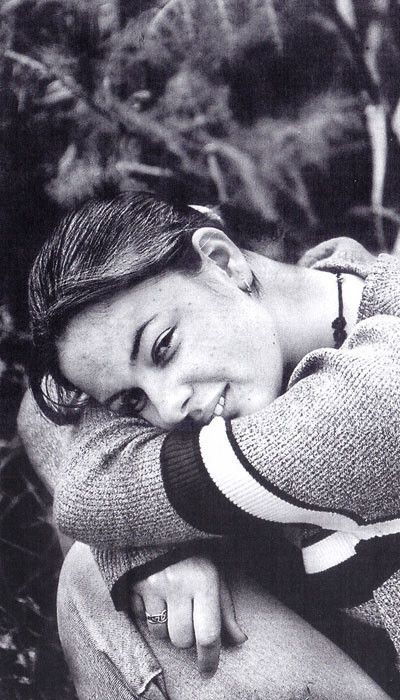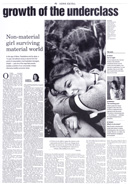This article appeared in The Australian 1 March 1999 p13
growth of the underclass |
|||
Non-material girl surviving material worldIn this age of Nikes, Playstations and lipgloss, |
 |
"They make us buy books that we use once or twice or five times through the year." They can be sold second- hand but they go down to half-price," says Sheena. Conscious of the strain of making ends meet, she mulls over matters that other kids never give a moments thought. "If I get a dollar for the bus, I'll put the 20 cents away and in a week or something, I'll have enough for swimming training." Her uniforms are second-hand. What is hard, she admits, is having no money for clothes. "The fashions are changing all the time...You know those Capri pants, by the time I get them, it'll nearly be over," she says, the laughter in her voice suggesting that she knows it is unimportant in the scheme of things but she can't help minding. A girl at school asked why she always wore the same things. "I've only got three outfits." She has on a sweater and jeans and owns another pair of pants, a top and a dress. And that's it, apart from her track suit pants and her school uniforms. Ryan has walked back into the kitchen to ask Sheena to thread the needle for him. He lost his glasses and doesn't have money to buy another pair. Sometimes, the thought of all the things they can't have makes him feel a failure, he says. On the other hand, all three of his kids are good kids. "I look around the shops and I see kids hanging around... None of mine do that. Those kids are dressed in $100 runners...My kids are in $19 runners. But I know where they are 24 hours of the day." Although he now has custody of his children, Brian feels cheated by a system that first gave his ex-wife custody and three-quarters of the property. "Three months later, I got a phone call to say I could have the kids." He pays $520 a month on the mortgage, owes $3500 for the rates, and doesn't know what to do about Sheena's school fees. He believed he would be able to pay the fees, because his wife promised to pay maintenance, he says. Ryan says he is calmer about the situation that he was. "He used to walk around the house saying 'oh what are we going to do', Sheena says. In her opinion, things could be a lot worse – and were, when they were with their mum living in a caravan, never knowing what would happen next. One week they lived on food coupons from the Salvation Army, she says. "Trav had a lot of responsibility when he was growing up. When we were going between mum and dad, and me and Mitch couldn't cope, he would help us out. When we were at mom's and she wasn't there, he would look after us." Now Travers is talking about moving out. He has been arguing with his father. Not a man to keep his views to himself, Patrick Ryan made it clear he was disappointed by his son's marks in the the VCE. He believes it is because Travers kept his casual job at Hungry Jacks. The young man wanted to have some money of his own to go to the movies or go bowling; inevitably, they argued about that too. "It bugs me a little bit that he's out doing his own thing and I can't do it for the other two," says Ryan. There are other causes of the friction between them. "I have to borrow money from my own son to buy a pack of cigarettes," says Ryan. It will be better, says his daughter, when she can help you out. "I don't really have money yet for him to borrow but I will. I can get a job soon and buy all my own stuff. They've already offered me a casual job at Hungry Jacks." Her school work won't suffer, she insists. "There's girls and boys at school who leave their assignments to the night before. "I do 'em as soon as I can. If you've got class time, you do 'em and if you finish, you can do another one." But when she mentions the job again, the father rapidly jumps in to say, "that's a real way off, though." Sheena Gives him a questioning look. "Not really," she says and, for an instant, determination glimmers like steel behind her 150-watt smile. |
|
|
Sheena Ryan should be busy with her school studies and enjoying life with her friends, but she's thinking about getting work to help out with money at home. "They've already offered me a casual job at Hungry Jack's" 'I'd love to be able to open the doors
|
|||
|
The cupboard is full of clothes and shoes, with discarded ballet things competing for space with forgotten toys. Consumption defines the world Australian children inhabit. Television advertising has impressed the brand names on them by the time they are seven or eight. Boys are demanding Nike Air Jordan's and girls are assembling a collection of lip glosses, hair gels, nail polishes and mousses that makes the average 13-year-old's dressing table look like a Hollywood film star has come to visit. A year or two more and the children have taken up residence in the nearest shopping mall. The boys, all elbows and acne, wear blowfly shades and Mambo shorts, and huddle over their cigarettes like tribesmen around a fire. The girls, in T-shirts and cargo pants, with adhesive Bindi spots on their foreheads and Converse cuffs on their feet, are cruising the shops, acquiring vital knowledge. Whether or not they can tell you the square root of 196 or the chemical formula for salt, they're knowledgable about Internet connection fees, the cost of a Sony Playstation ($187) and the merits of different brands of mobile phones. Lessons at her school aren't yet interrupted by the ringing of the students' mobile phones, but Sheena can hardly help noticing the distinctions between her friends' lives and her own. Her dad is on the sole parent pension - he says he couldn't work full-time and look after the kids. Between the pension and the additional family payment, they get $625 a fortnight. Ryan, an intense stocky man with hair that stands up like a brush, sometimes picks up part-time work as a carpenter but when we meet, he hasn't worked for nine weeks and is sitting in front of the television, needle and thread in hand. |
"I would love to have clothes instead of sitting down sewing buttons on old shirts," he says, asked what he'd do with more money. "I'd love to take my kids on a holiday." He and Sheena exchange a rueful glance. He doesn't even have money to fix his car. He swerved and hit a pole when the vehicle in front of him slammed on the brakes. But Ryan isn't insured. The sort of accident that would be a nuisance for you and me leaves him and his family without transport indefinitely. But he is thinking what he would do with another 100 bucks or so a week. "I'd love to be able to open the doors to the cupboards and know there are things there the kids can snack on, and I'd like the kids to be able to do everything their mates do at school," says Ryan. "The reality is we can't..." "Dad was thinking of taking me out of Penola," Sheena says. While the $1,100-a-year fees for her school are mounting up, the money covers camps, excursions and other extras and the school has told Ryan to pay when he can. The State schools seem to be too hard-pressed to do anything of the sort. Children from poor families may be left out altogether or told not to take home their artworks or the food cooked in domestic science classes because they haven't paid for materials. The kids may be singled out by teachers and students alike. Mitchell Ryan was at a State primary last year. When he went to camp and her father couldn't pay for it until afterwards says Sheena, "Mitchell felt bad about that, I know. His friends probably said something." Her dad talks with them about everything that affects the family and Sheena is worried instead about the expenses at the beginning of the school year. "It's pretty hard for dad...all at once, he has to buy books, uniforms, news shoes and everything. | ||

